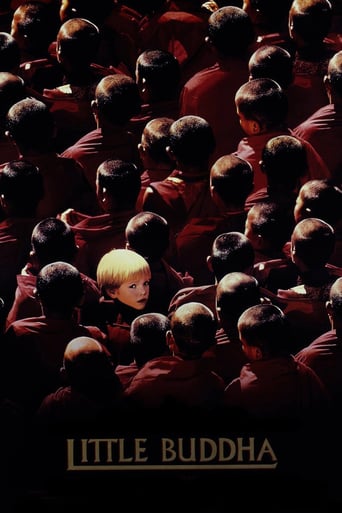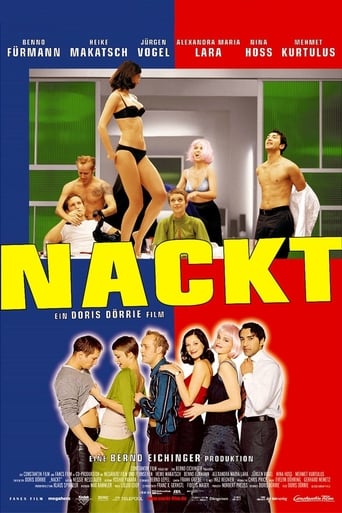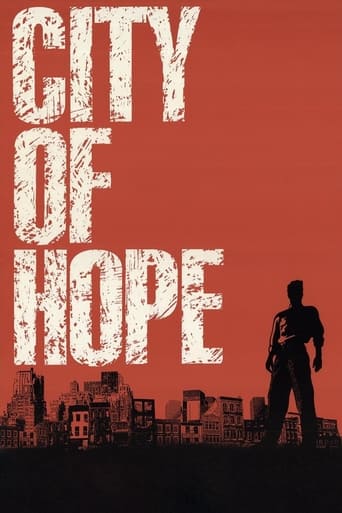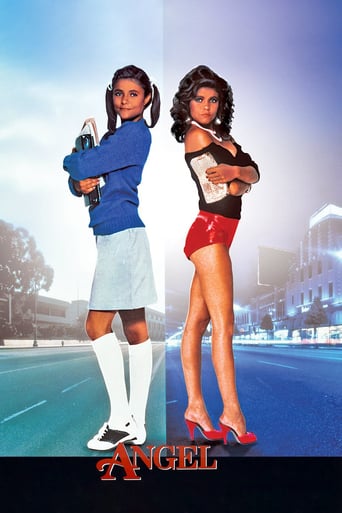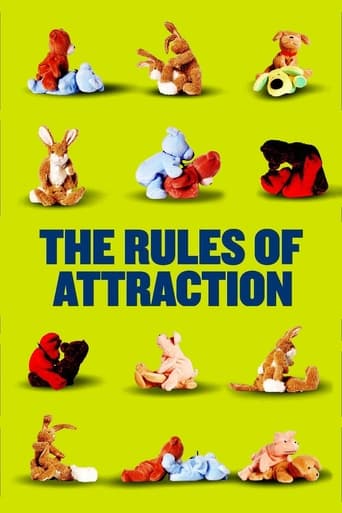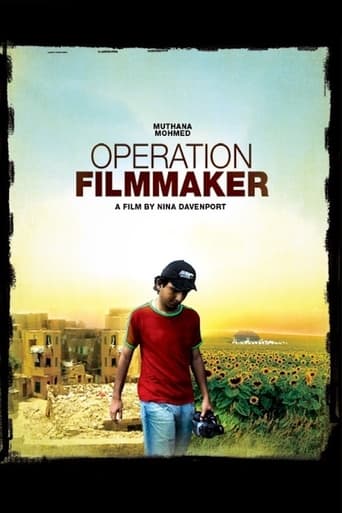

Operation Filmmaker (2008)
Soon after the fall of Baghdad in 2003, a young and charismatic film student, Muthana Mohmed, stands in the rubble of the city's film school and explains to an American television audience that his dream of becoming a filmmaker has been destroyed - first by Saddam Hussein, then by American bombs. This brief, fortuitous appearance on MTV changes Muthana's life forever. Watching in the United States, actor/director Liev Schreiber stops channel surfing, utterly captivated. Feeling guilty about a war he opposed, Schreiber decides to extend to the unknown Iraqi the opportunity of a lifetime - to come to Prague to work on an American movie, Everything Is Illuminated. On set, frustrated expectations complicate the relationship between Muthana and his American benefactors in what becomes a cross-cultural endeavor gone awry. Filmmaker Nina Davenport becomes increasingly entangled in the young Iraqi's life as his visa is about to expire and the threat of returning to Baghdad looms...
Watch Trailer
Cast


Similar titles
Reviews
So much average
Expected more
Great movie! If you want to be entertained and have a few good laughs, see this movie. The music is also very good,
There are moments that feel comical, some horrific, and some downright inspiring but the tonal shifts hardly matter as the end results come to a film that's perfect for this time.
I felt this film was a study of ulterior motives; and after watching it, it left me focusing on the behaviour of the members of the film crew rather than Muthana's deeds. Muthana's journey out of Iraq is presented as an altruistic experiment; but, much like the invasion, the ramifications are ill-thought and the gesture is meek.It seems that much of US politics focuses on character, so I can see why a person might judge this film on the personality of it's main-player; but I think that it would be an error to summarise 'Operation Filmmaker' based on a reflection of Muthana.In my opinion, it's unfortunate that the previous poster has overlooked the fact that Muthana was engaged in a project that seemed more focused on professional vanity, than genuine support.Part way through the film, some members of the crew express their displeasure that he wasn't more humble and willing to chip-in, but I'm left thinking that this may have been because he didn't meet the specific narrative objectives that they had imagined he'd fulfil. The decision to document the project from the very beginning, in some way seemed testament to this.I came away thinking about how the war in Iraq has affected Iraq's society in complex ways. We're often informed of what the 'Iraqi citizen' thinks but we're rarely exposed to the idea that there is no general consensus. The society of Iraq is often trivialised and compacted into a monoculture it's strange and bizarre that we're able to accept this.The film is interesting on many levels and it feels like the result wasn't expected by those involved in the project which makes the journey all the more engaging. Mostly it reminded me of the importance of conviction and the folly involved in trying to absolve guilt using superficial means.
When an American actor spotted a short MTV film about a bombed Iraqi film school, he arranged for one of the students to work as an intern on 'Everything is Illuminated', the movie has was about to direct. Unfortuantly, Muthana turned out to be spoilt, proud and unable to enjoy the unglamourous chores that comprise an intern's lot. But immaturity is not a crime, and it's understandable when Muthana tries to plan a permanent escape from Iraq, given the terrible situation at home. But his attempts to wheedle money and favours from those who have helped him are embarrassing: he is the sort of person who, through claiming not to care about money, always needs others to give it to him. But Nina Davenport's documentary about Muthana is arguably a film that shouldn't have been released. The story she might have hoped to make, that of a fairytale, never comes true. Moreover, as she continues to film in spite of the absence of narrative, Muthana identifies her as the most useful person he can tap for money and contacts (and makes the fair point that she is aiming to make money out of filming him). The film ends on an unhappy note all round - Nina is feeding Muthana (with money, and assistance on foreign visas) and is feeling trapped; Muthana (as a flat-mate succinctly puts it) believes himself to be the only person in the world with problems, and the integrity of this documentary has been compromised, as Muthana's relationship with the film-maker becomes the film's own subject. Some of the most riveting documentaries I've seen feature a film-maker who inadvertently becomes part of the story; sometimes a director goes on camera because of their ego; in Nina's case, the motivation appears to be simple: she doesn't have anything else to film. And one sad story amidst a greater tragedy plays out worse than it needed to because of it.
Here's another documentary where the filmmaker is sent on a mission and must hang on for dear life when it all heads in a different direction. Nina Davenport deserves credit for climbing back on even when her subject, young Baghdad film student Muthana Mohmed, stops the filming. Her success is perhaps best measured by the degree to which her film is infuriating and frustrating to watch--and quite possibly embarrassing to all concerned.In 2004 about to direct 'Everything Is Illuminated', famous actor Lief Schreiber sees Muthana on MTV in Baghdad holding forth in fluent colloquial English about how the US invasion has destroyed his film school. Wouldn't it be a good idea to rescue Muthana from this situation, Schreiber thinks, by bringing him to the Czech Republic to work as an intern on the set of 'Everything Is Illuminated'? Actually, it's not really a very good idea at all. It's the kind of hasty, ill conceived do-gooding Americans are famous for, based on no very careful consideration of the people involved or the consequences to those most directly concerned. To begin with Schreiber et al. don't know much about Muthana and his background--or about Iraqi or for that matter general Arabic culture. Nor is Muthana prepared for interning on an American movie set. Most probably that wasn't the kind of job this upper class boy was ever looking for in going to film school.But much more importantly this is a bad idea because, given the current situation, the very circumstances that disrupted Muthana's film school, no young Iraqi in his right mind, once out of Iraq, is likely to want to go back. Schreiber didn't think of that. It wasn't part of feeling good. He did prepare to record this, his "good deed," by setting up somebody through MTV--Ms. Davenport--to make what was expected to be a heartwarming documentary about Muthana's wonderful experience as an intern on his movie. Instead, he got this film, which is hardly heartwarming even for a minute. It's safe to say that nobody looks very good in it, not even Ms. Davenport. It's true everybody is strained to the limit. But whose fault is that? Should we blame MTV? Davenport encouraged Muthana to be himself. Uh-oh. He disappoints the film's Jewish liberal producer by declaring "I love George Bushhe changed my life" and no doubt offends everybody on hand by referring to 'Everything Is Illuminated' (which incidentally fared worse critically than this documentary), a film that deals extensively with the Holocaust, as "a movie defending the Jewish theory." But that's just a passing remark; he doesn't dwell on it. He is, over time, somewhat furious that--especially after arriving as a kind of celebrity--he gets put to work as a lowly gofer's assistant serving producers vegan tidbits. "What the f---!" he tells Davenport's camera, "The most important scene was rolling on the set while I was mixing the snacks!"Contradictorally, Muthanna has been given a posh apartment in Prague--and this crap job he doesn't know how to do. Since he doesn't warm to the task, the fault-finding soon begins on his hosts' part. One person says he ought to have sucked up to somebody really big time right at the start, so he'd be taken care of later. He's pulled in many directions, with desperation at the edge. He's supposed to edit the movie-wrap gag film in 48 hours (why 48 hours?) He misses the deadline, because he goes to a big party. He had to, he says; they were his friends! He's a sociable guy; he's also basically just a kid, rather a handful, with a lot of personality, and not the hardest worker around. Looking no doubt for their own exit strategy, the producers and Schreiber go about finding fault with Muthana as a slacker and an ingrate. Which of course in a way he is.But there's also the desperation. Videos come from his fellow students and family in Baghdad, warning him for God's sake not to come back. His Czech visa is running out. He gets it renewed several times. The film wraps. The gag film is shown. Muthana says he helped on it. It makes Elijah Wood ecstatic. He asks Muthana if he has email. The 'Illuminated' crew departs. Muthana stays on--he gets hired on the spot as a gofer for 'Doom,' a sci-fi horror action adventure being shot in Prague starring The Rock, Dwayne Johnson. He shapes up as a gofer, does his job now with a smile, plays up to The Rock, who thinks he's a hero (like him!)--and shakily, gets The Rock to donate the money so he can transfer to a film school in London. Meanwhile, Muthana's finances are more and more on the edge, and he keeps hitting people up, notably Davenport, who doesn't like it. She wonders why he doesn't run out and get a job, any job, when he gets to London and has all of three pounds in his pocket. This is when he absolutely and finally refuses to continue with her film.When he lets her back, he's completing a year of the London film school and he tries to blackmail her into giving him more money demanding ransom for some film he's holding. He's humiliated because he wasn't chosen to direct a film at the (obscure) London school: he's just an assistant cameraman on another student's film. The question is, what is he going to do next? Some say he could be an actor, and an admissions person at the New York Film School says, viewing a video he's sent, "He's very, very castable in today's market." According to Davenport in a post-film interview, Muthana has been given asylum in England for five years.And this is what happened. A documentary can do no more than tell us that, and Davenport's film is well edited to show everybody as truthfully as she could.
A young film student gets himself on MTV expressing his feelings about his dreams of becoming a film maker being shattered by first the dictator ruling over his country of birth, Iraq, and then by US that bombed it. This show gets seen by an American film maker that wants to give him a chance of a life time and invites him to come to Prague to help and learn during a film he is making there.This documentary starts there, as the student arrives and starts helping along in the making of the film and gets introduced to all the various angles to making one. As it continues it shows the changes in the student and his surroundings and the way he deals with that.Being a typical documentary this film doesn't have any special effects whatsoever - except for the occasional ones seen when they arrive at the scene of a film that uses them. It uses a very direct and personal approach and the maker of the documentary herself gets fairly involved with the person she is filming and that makes it very close but also very nice to watch. It's a bit like reading some ones personal diary but with them standing right next to you and commenting on what you are reading.It is easy to judge the film student but for me that isn't the point of a film review. As a documentary I can rate this fairly highly as it uses an interesting approach that keeps one bound to the chair during its full length.8 out of 10 film makers interrogated







